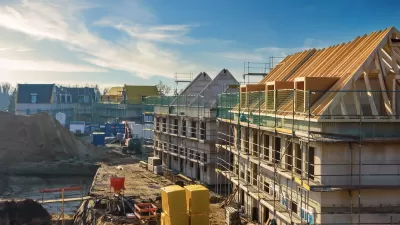Undoing Oregon’s urban growth boundaries won’t solve the state’s housing crisis, an opinion piece argues. Smart growth lies within existing cities.

An opinion piece by Sam Diaz, Kim McCarty and Steve Messinetti in The Oregonian argues against removing the state’s urban growth boundaries, which restrict development within a certain geographic area around each city.
The piece is written in response to a November 12 column by Steve Duin that proposed eliminating the urban growth boundary as a way to relieve the state’s housing affordability and supply crisis. According to the authors, Duin’s suggestion “will not result in housing options near existing schools, parks, jobs, stores and services that most Oregonians can afford.”
As the authors explain, “The urban growth boundary is an innovative policy for designating land for development that continues to achieve its goals of preventing climate-harming and congestion-inducing sprawl while protecting land that grows our food and offers us moments in nature.” The article points out that cities without urban growth boundaries aren’t faring any better when it comes to the housing crisis, and that ignoring growth boundaries would promote sprawl.
The real solution, the authors write, is more complex. “We need a comprehensive approach that includes stabilizing renters at risk of eviction, land use policies that encourage density near jobs and transportation, funding to close racial disparities in home ownership, fast-track permitting and fee waivers to encourage affordable housing, and increasing availability of underutilized land within urban growth boundaries.”
FULL STORY: Opinion: Undoing urban growth boundary isn’t the answer to our housing crisis

Alabama: Trump Terminates Settlements for Black Communities Harmed By Raw Sewage
Trump deemed the landmark civil rights agreement “illegal DEI and environmental justice policy.”

Study: Maui’s Plan to Convert Vacation Rentals to Long-Term Housing Could Cause Nearly $1 Billion Economic Loss
The plan would reduce visitor accommodation by 25% resulting in 1,900 jobs lost.

Planetizen Federal Action Tracker
A weekly monitor of how Trump’s orders and actions are impacting planners and planning in America.

Wind Energy on the Rise Despite Federal Policy Reversal
The Trump administration is revoking federal support for renewable energy, but demand for new projects continues unabated.

Passengers Flock to Caltrain After Electrification
The new electric trains are running faster and more reliably, leading to strong ridership growth on the Bay Area rail system.

Texas Churches Rally Behind ‘Yes in God’s Back Yard’ Legislation
Religious leaders want the state to reduce zoning regulations to streamline leasing church-owned land to housing developers.
Urban Design for Planners 1: Software Tools
This six-course series explores essential urban design concepts using open source software and equips planners with the tools they need to participate fully in the urban design process.
Planning for Universal Design
Learn the tools for implementing Universal Design in planning regulations.
Caltrans
Smith Gee Studio
Institute for Housing and Urban Development Studies (IHS)
City of Grandview
Harvard GSD Executive Education
Toledo-Lucas County Plan Commissions
Salt Lake City
NYU Wagner Graduate School of Public Service





























